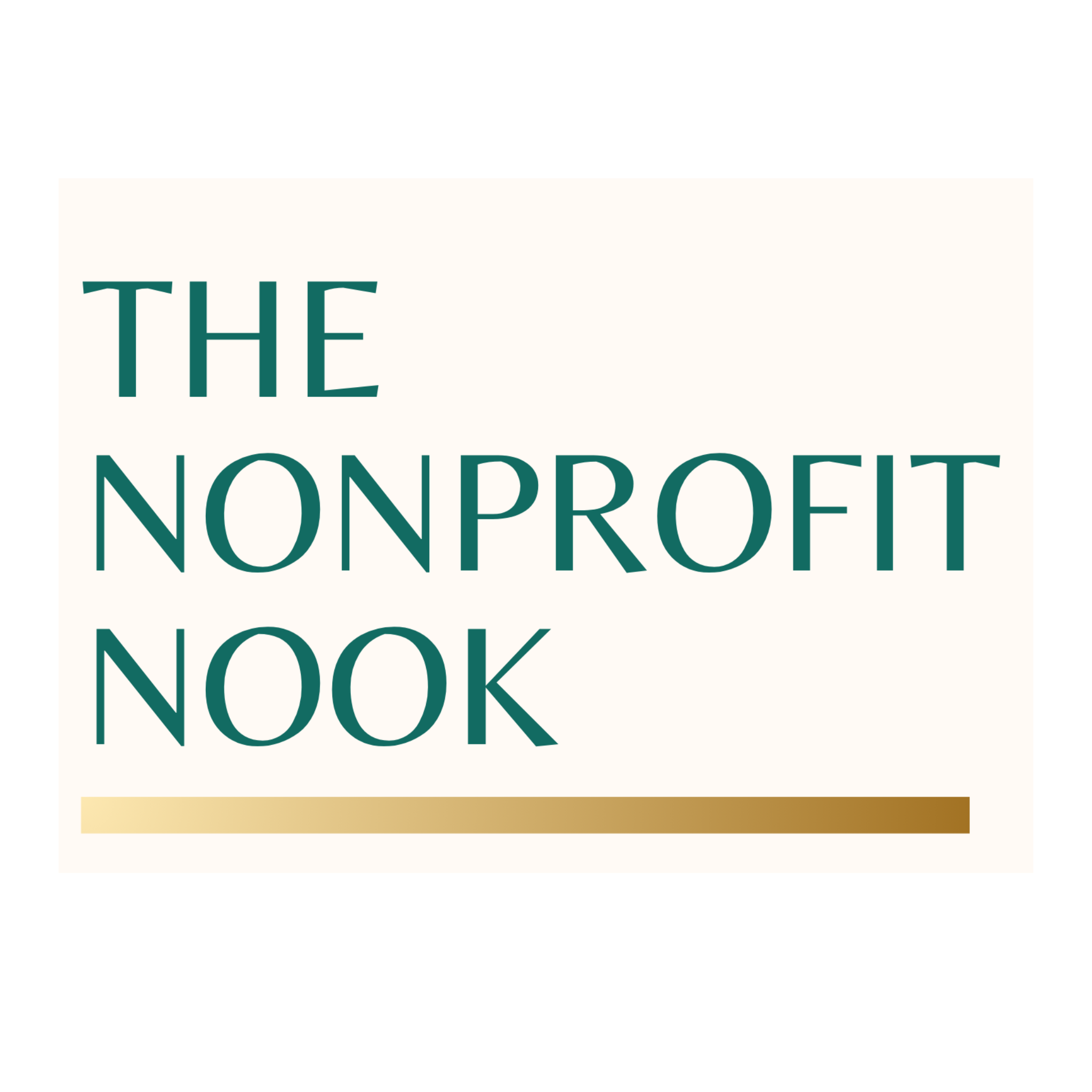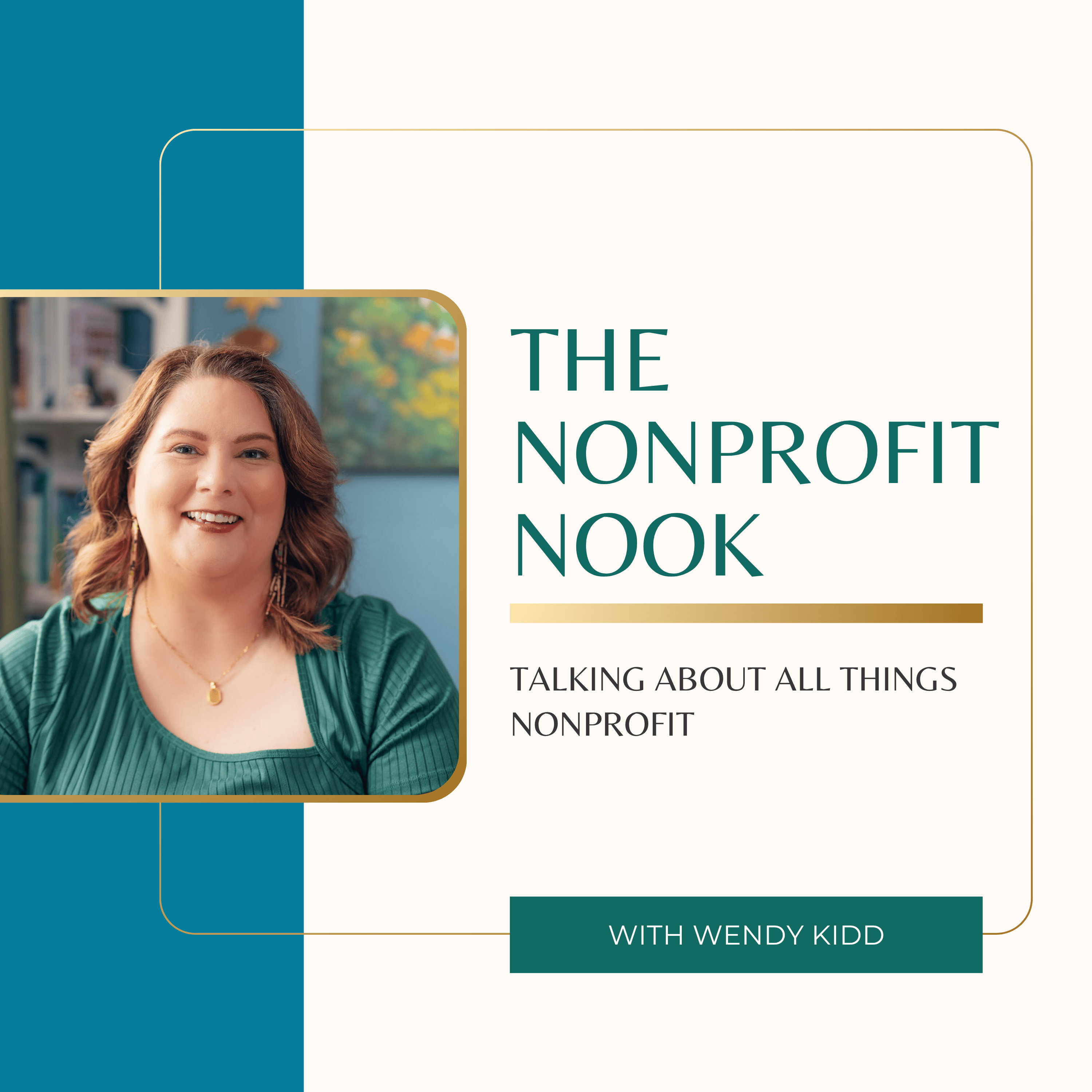Beyond the Clock: Time Management for Nonprofit Leaders
This episode of The NonProfit Nook, hosted by Wendy Kidd, focuses on the importance of time management for nonprofit leaders. Wendy discusses how time management isn't about control, but about creating the freedom to focus on what matters, rest without guilt, and lead with clarity and purpose. She provides practical tips, such as tracking how time is spent, setting clear priorities, using time blocking, and building habits around these new routines. Wendy also addresses potential resistance to change and the importance of clear communication. The episode emphasizes that good time management is about doing what matters most and maintaining a healthy, well-balanced life to effectively lead a nonprofit organization.
Links:
https://www.bosslevelengaged.com/services-for-nonprofits-nonprofitnook
https://www.youtube.com/@BossLevelEngaged
https://www.instagram.com/thenonprofitnook/
Time Management from the Inside Out by Julie Morgenstern
00:00 Introduction to Time Management
00:20 Welcome to The NonProfit Nook
01:06 Wendy's Personal Insights on Time Management
02:01 The Reality of Non-Profit Leadership
03:14 Setting Boundaries and Prioritizing Self-Care
03:42 Tracking and Analyzing Your Time
05:54 Establishing Priorities and Saying No
07:23 Time Blocking for Effective Management
09:29 Adapting to Change and Communicating Boundaries
11:04 Recommended Reads for Time Management
12:33 Final Thoughts and Encouragement
13:07 Closing Remarks and Call to Action
Mentioned in this episode:
Transcript
Time management isn't about control.
2
:It's about freedom.
3
:Freedom to focus on what matters most.
4
:Freedom to rest without guilt and
freedom to lead with clarity and purpose.
5
:As nonprofit leaders, we give so much
of ourselves to others, but your mission
6
:needs you healthy, rested, and present.
7
:Wendy: Welcome to The NonProfit
Nook, the podcast for nonprofit
8
:leaders, board members, and community
change makers who want to build
9
:stronger, smarter organizations.
10
:I'm your host, Wendy Kidd, a longtime
business owner and nonprofit leader,
11
:and I'm here to bring you real talk,
real tools and real stories to help
12
:you thrive in the nonprofit world.
13
:I'll be talking with local nonprofit
leaders, community change makers
14
:and experts in everything from board
development to fundraising and digital
15
:tools, sharing real stories and
simple strategies you can actually use
16
:because running a nonprofit is hard,
but you don't have to do it alone.
17
:Let's get started.
18
:Wendy Kidd: Hey friends, Wendy here.
19
:Welcome back to The Nonprofit Nook.
20
:This is my first solo pod, so welcome
to this little experiment of mine.
21
:I have so many topics that I've
thought about doing for this podcast,
22
:but what really keeps resonating
for me right now is time management.
23
:It's one of my favorite things.
24
:I know I'm a nerd.
25
:But before you roll your eyes and
think, oh, great, another person telling
26
:me how to do something that doesn't
work, stick with me for a minute.
27
:Because this isn't about cramming more
into your day or about telling you how to,
28
:you need to take things off your plate.
29
:It's about creating space
for what matters most to you.
30
:So many of my friends and colleagues
say to me, you're so organized, or
31
:How do you have time for everything?
32
:And I always respond with,
you have to make time.
33
:But what does that really mean?
34
:The reality of non-profit
leadership is we are always on.
35
:We're expected to be there for everyone.
36
:Our staff, our volunteers,
our board, our community.
37
:We're the ones holding things together,
but if we don't take care of ourselves,
38
:we can't hold anyone else up.
39
:It's like they always say when
the oxygen masks drop down,
40
:you have to put yours on first.
41
:But the reality is that doesn't
just apply to emergencies.
42
:When we don't manage our time
intentionally, we end up accessible
43
:to everyone all the time, calls,
texts, emails, at all hours.
44
:You know what I mean?
45
:That late night message from a board
member who's catching up after work or
46
:that early, early morning volunteer call.
47
:It's also all the meetings, last
minute meetings, pick up meetings
48
:when someone walks in, someone
always just wants to check in.
49
:It's not that they're trying to interrupt
you, they're just working when they can,
50
:but it can be overwhelming and in my
opinion, is the fastest way to burnout.
51
:Have you ever just felt like you wanted
to disappear so no one can find you?
52
:Yep.
53
:Been there, felt that?
54
:Here's the thing.
55
:We as leaders have to set boundaries.
56
:We need rest.
57
:We need time for our families.
58
:We need space to breathe so
we can keep showing up for
59
:others in a sustainable way.
60
:We even need to take time to be
creative and think outside the box.
61
:So we can keep leading.
62
:So how do we manage with intention
and not guilt because that's
63
:what we end up doing so often.
64
:First things first.
65
:You can't manage what you don't measure.
66
:If you've never done this before,
I want you to start by tracking
67
:how you actually spend your time.
68
:Do it for a week, or
better yet, two weeks.
69
:You can jot notes in a notebook,
use your calendar, or even
70
:download a fancy time tracking app.
71
:Whatever works for you and is easy,
something that's doable and manageable.
72
:Okay?
73
:Not something that adds a bunch of
time to your schedule, because we
74
:wanna capture your schedule as is.
75
:The key is to capture as
much detail as possible.
76
:Seriously, things like, I spent 45
minutes checking you email, or I spent
77
:30 minutes scrolling social media,
or an hour prepping for a meeting, or
78
:20 minutes trying to find that sign
I had made, and even the personal
79
:stuff, like 20 minutes getting my kid
dressed, or 30 minutes driving my kid
80
:back and forth to a school activity.
81
:45 minutes researching recipes and
creating a meal plan or an hour
82
:grocery shopping, whatever it is.
83
:Take note, make sure it's on your list
and at the end of that week or the two
84
:weeks, I want you to look at it honestly.
85
:I'm betting you're gonna be surprised.
86
:I know every time I do this, there's
always something that surprises me.
87
:And do yourself a favor.
88
:Don't judge yourself over what you see.
89
:It is no one's business.
90
:How much time you spend on social media
or watch tv or do anything else you
91
:might feel like you shouldn't be doing.
92
:Don't fall for the negativity trap.
93
:Just observe what's happening.
94
:You'll start to see patterns like when
you're most productive, where time slips
95
:away or even patterns on what your most
common interruptions or emergencies are.
96
:And yes, I'm using air quotes for
those not watching this on video
97
:because we all know how someone else's
emergency can affect your schedule.
98
:Now this is where most people
start using the word delegate when
99
:it comes to things on your plate.
100
:But I, uh, that's another podcast.
101
:In my opinion right now I'm
focused on how to make time.
102
:So let's just go with
what you're doing now.
103
:Now that you see where time
really goes, you can start making
104
:intentional choices about it, right?
105
:But let's not jump the gun.
106
:Next, I want you to write down
and say out loud your priorities
107
:for how you wanna spend your time.
108
:It sounds simple, but it's actually
really powerful because saying
109
:it out loud gives it weight.
110
:Putting in writing gives
it even more weight.
111
:So I want you to ask yourself,
what do I want more time for?
112
:What gives me energy, what drains
me, but I still have to get it done?
113
:Maybe your priorities are family dinners
or personal time for learning, or even
114
:just a dedicated space for strategy
work, not just putting out fires.
115
:When you know what truly matters,
it's easier to say yes with
116
:purpose, and no with confidence.
117
:And that's how you make time.
118
:Saying no will feel very weird at
first, but trust me, just just go
119
:with it a few times, see what happens.
120
:I bet you'll find it works wonders
on your schedule and you might
121
:find it becomes a little addictive.
122
:Don't worry.
123
:The freedom it gives you will feel good,
but I doubt you'll go overboard with this.
124
:Knowing what's important to you is
empowering, and honestly, once you
125
:realize it, you'll see that that's
what real time management is all about.
126
:Now, let's take those priorities that
you wrote down and that you said out loud
127
:and start building structure around them.
128
:This is where time blocking comes in.
129
:Time blocking means grouping similar
tasks together and assigning specific
130
:blocks of time to focus on them.
131
:For example, Mondays could be
for planning and staff check-ins.
132
:Tuesdays could be for
donor outreach or meetings.
133
:Wednesday nights, maybe those are
always for school activities, and
134
:maybe Fridays are for your creative
work or your long-term strategy.
135
:You might even block personal
time, which I hope you do for
136
:reading or exercise or just rest.
137
:And here's the trick.
138
:You have to treat those
blocks like appointments.
139
:I know it's hard, but you wouldn't
skip a board meeting, right?
140
:So don't skip your own
protected time either.
141
:This is how you create a week that
aligns with your values instead of
142
:reacting to everyone else's urgency.
143
:Once you've built your time block
calendar, I want you to commit
144
:to trying it for one month.
145
:I know sounds like a long time, but I
promise you you're gonna need that time.
146
:You wanna put it in your calendar
and you wanna really live in it.
147
:See what works, see
what doesn't take notes.
148
:And at the end of the month, I want
you to reflect not with judgment, but
149
:curiosity, and I want you to ask yourself
what felt easy about this new calendar?
150
:What was really hard to make work and
what would make this more realistic?
151
:And then I want you to tweak it.
152
:Now's the time to adjust because
good time management isn't rigid.
153
:It evolves as you do.
154
:The goal isn't perfection,
it's awareness and progress.
155
:This is gonna be one of those things
that just changes over time as your life
156
:changes, as your roles change, as your
commitments and your relationships change.
157
:And feel free to do this exercise over
and over because things just might change.
158
:This year has been a full year
of change for me, and I'm still
159
:in the works of figuring out my
new rhythm, my new time block.
160
:I'm gonna be honest with you, when you
start making these changes, you might
161
:also get some pushback from people.
162
:They're gonna notice, and
people don't love change.
163
:I'm one of the weirdos that does, but
most people don't love change, especially
164
:if your new boundaries make things
a little less convenient for them.
165
:Your board might need to adjust
how they communicate with you.
166
:Your staff might need more planning time
just to get on your calendar, and your
167
:family might notice the shift at first.
168
:But this isn't about them.
169
:It's about creating the
life you want and you need.
170
:And the best way to manage that
pushback is through clear communication.
171
:Communication solves most of the
world's problems, in my opinion.
172
:So you need to tell people what
you're doing and why you're doing it.
173
:You know, you could say things
like, I realized I need focus time
174
:to work on strategy, so I'm gonna
limit my meetings on certain days.
175
:I'm turning off notifications after
six o'clock so I can recharge, so I'll
176
:respond to any text to the next day.
177
:You don't owe anyone a big explanation.
178
:Just be confident in your
choices and they'll respect that.
179
:The more intentional you are
about your time, the more others
180
:will learn to respect it, even
if they didn't at the beginning.
181
:In the long run, they are also going
to notice how great it is for everyone.
182
:When you are stronger because of your
calendar, you'll probably feel less
183
:anxious and more put together, which is
gonna come across to those around you.
184
:It's a win-win.
185
:Now if you wanna nerd out like me and go
deeper into the how of time management,
186
:there are two books I absolutely love
and I recommend them to anyone who
187
:wants to learn more about this stuff.
188
:The first one is one that I
read, I don't know, decades ago.
189
:Uh, it's called Time Management
From The Inside Out by Julie
190
:Morgan Stern, Julie Shares.
191
:This really great story about
when she had her first kiddo and
192
:she was going to take them to the
park and she realized, oh wait.
193
:I'm gonna need this and I'm gonna
need that, and I'm gonna need this.
194
:And by the time she figured up all the
things that she needed to get outta
195
:the house with this kiddo and put
together her diaper bag, she realized
196
:she'd run outta time to go to the park.
197
:And she realized she needed
to change what was important.
198
:Her story about becoming a mom
and realizing she needed a plan
199
:for her time changed how I thought
about my time management and
200
:relating it back to my priorities.
201
:And the second one that I love
is Atomic Habits by James Clear.
202
:Now, this one's all about how to make.
203
:Habits and how to make small
and consistent changes that are
204
:gonna transform your daily life.
205
:So it fits really well with
the time management from Julie.
206
:And if you struggle like me sometimes
to stick with routines or you just
207
:wanna build better habits around
your time, this one's a game changer.
208
:I'll, of course, make sure to link both in
the show notes so you can check 'em out.
209
:So with all that said, here's
what I want you to remember.
210
:Time management isn't about control.
211
:It's about freedom.
212
:Freedom to focus on what matters most.
213
:Freedom to rest without guilt and
freedom to lead with clarity and purpose.
214
:As nonprofit leaders, we give so much
of ourselves to others, but your mission
215
:needs you healthy, rested, and present.
216
:So take the time, protect your time, plan
for your time, and make sure it reflects
217
:the life you actually want to live.
218
:I hope this helps you guys.
219
:That's it for today's episode
of The Nonprofit Nook.
220
:If this resonated with you, I'd
love to hear what changes you're
221
:planning to make this month.
222
:I'd love to have conversations about
this stuff, so reach out and remember,
223
:managing your time isn't about doing
more, it's about doing what matters most.
224
:Wendy: Thanks for listening
to The NonProfit Nook.
225
:We're building better nonprofits together.
226
:If you found today's episode
helpful, please subscribe.
227
:Leave a review and share it with other
nonprofit leaders who need support.
228
:Follow the nonprofit Nook on
social media and sign up for
229
:our email list for extra tips.
230
:And.
231
:You can also visit the nonprofit nook.com
232
:to see the show notes and leave a comment
telling me what topics you want next.
233
:Your feedback shapes the show.
234
:See you next time.


